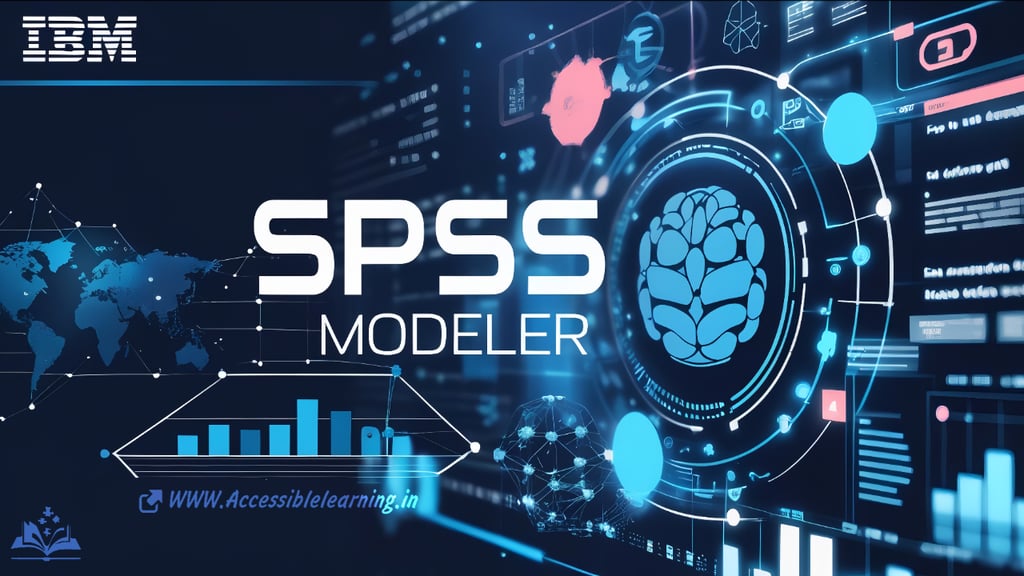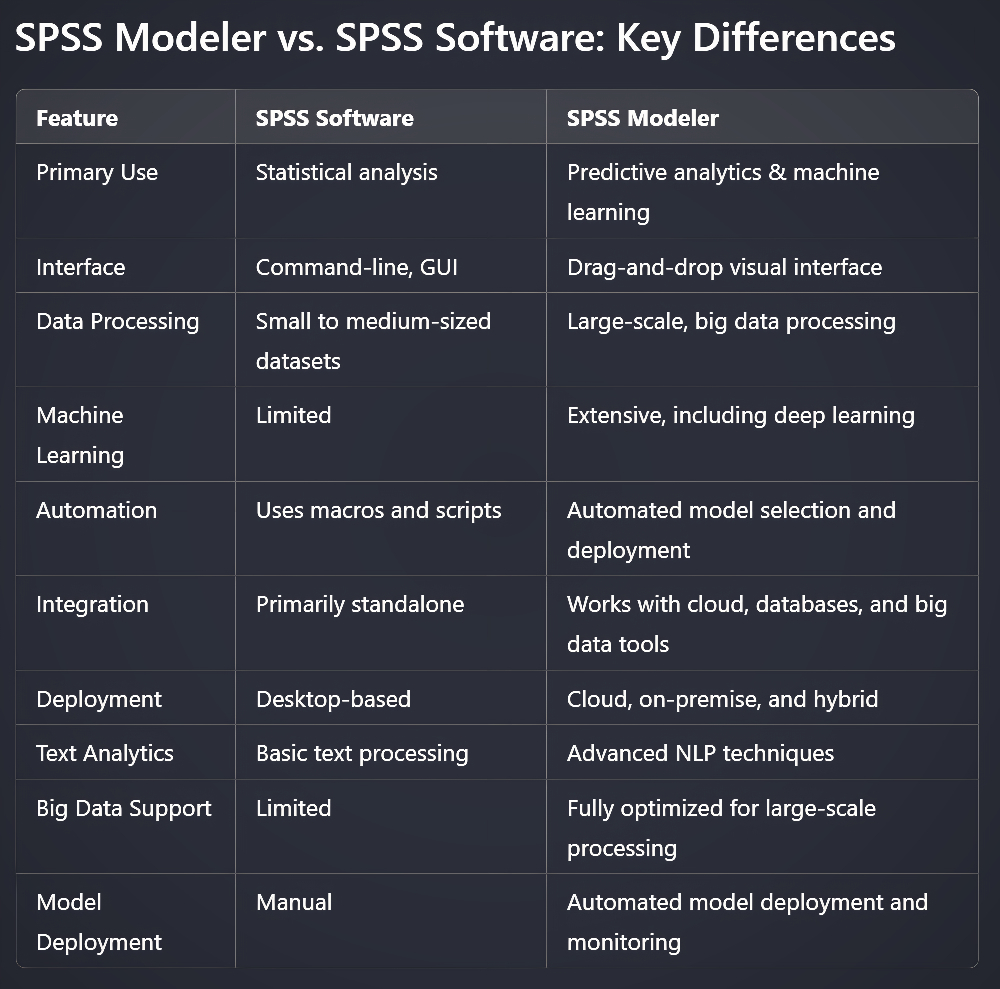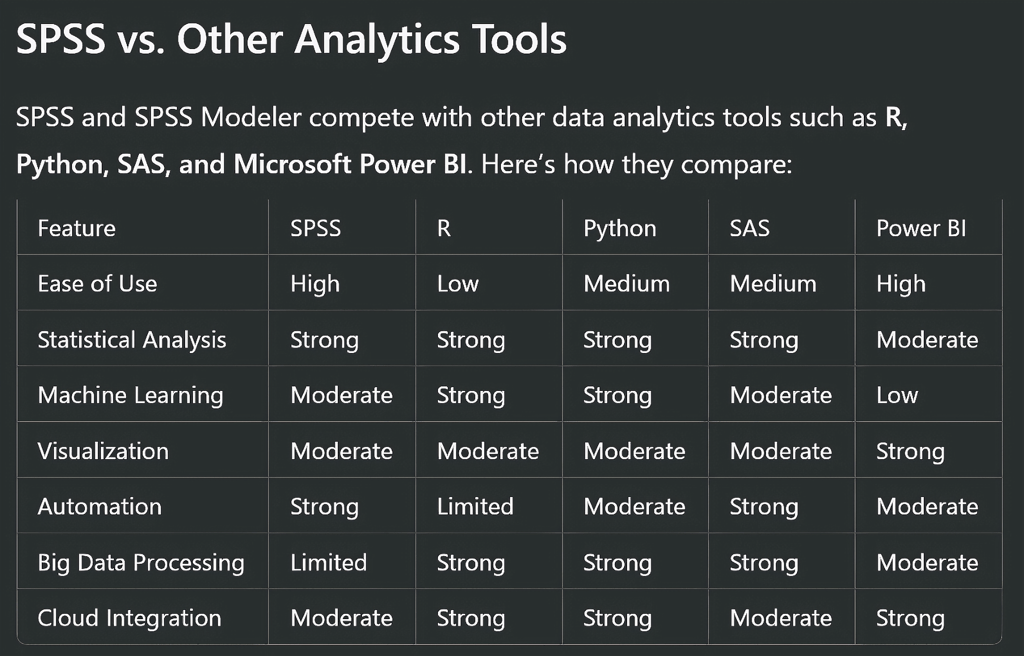
SPSS for Data Science: Statistical Analysis vs. Machine Learning?
Discover the power of IBM SPSS Modeler and SPSS Software in data analytics, predictive modeling, and machine learning. This in-depth guide explores their features, differences, benefits, and use cases to help you choose the right tool for your data-driven needs.
AI/FUTUREAI ASSISTANTA LEARNINGEDUCATION/KNOWLEDGE
Sachin K Chaurasiya
2/7/20254 min read


IBM SPSS (Statistical Package for the Social Sciences) is one of the most widely used software applications for statistical analysis and predictive modeling. Over the years, it has evolved to cater to diverse industries, including healthcare, education, business, and social sciences. One of its most powerful tools, SPSS Modeler, extends the capabilities of standard SPSS software by focusing on advanced analytics and machine learning.
In this article, we will explore SPSS Modeler and SPSS Software, their differences, features, benefits, use cases, licensing, and how they compare to other analytical tools, helping you understand which tool suits your analytical needs best.
What is SPSS software?
SPSS is a statistical analysis tool developed to manage, analyze, and interpret data efficiently. It provides a user-friendly interface for researchers, data scientists, and business analysts to perform various statistical tests, data visualization, and predictive analytics.
Key Features
Data Management: Easily import, clean, and manipulate datasets.
Descriptive Statistics: Generate summaries, frequencies, means, and standard deviations.
Inferential Statistics: Perform hypothesis testing, t-tests, ANOVA, regression analysis, and chi-square tests.
Data Visualization: Create bar charts, histograms, scatter plots, and more.
Predictive Analytics: Utilize regression models and forecasting techniques.
Automation: Use SPSS syntax and macros for repetitive tasks.
Survey and Data Collection Integration: Works with Qualtrics, SurveyMonkey, and other data collection tools.
Multivariate Analysis: Conduct factor analysis, cluster analysis, and discriminant analysis.
Data Transformation: Apply functions such as normalization, standardization, and scaling to preprocess data.
Statistical Process Control: Monitor and improve process efficiency through control charts.
What is SPSS Modeler?
SPSS Modeler is an advanced data mining and predictive analytics tool that allows users to build, evaluate, and deploy machine learning models. Unlike standard SPSS software, which focuses on statistical analysis, SPSS Modeler is designed for big data processing, pattern recognition, and AI-driven decision-making.
Key Features
Drag-and-Drop Interface: No programming knowledge required.
Machine Learning Algorithms: Supports decision trees, neural networks, clustering, and deep learning models.
Text Analytics: Extract insights from unstructured data such as reviews and social media.
Time Series Analysis: Forecast trends and patterns over time.
Big Data Integration: Works with Hadoop, Spark, and relational databases.
Automated Model Selection: Suggests the best models based on dataset characteristics.
Cloud and On-Premise Deployment: Provides flexibility in data storage and processing.
Geospatial Analytics: Analyze location-based data for deeper insights.
Data Preparation and Cleaning: Handles missing values, outliers, and feature engineering for optimal model performance.
Advanced Neural Networks: Supports deep learning techniques, including convolutional and recurrent neural networks.
Optimization Techniques: Includes gradient boosting, random forests, and hyperparameter tuning for better model performance.


Benefits of Using SPSS Modeler & SPSS Software
User-Friendly: Both tools cater to users with varying levels of expertise.
Accuracy: High-quality data analysis ensures reliable results.
Scalability: SPSS Modeler is suitable for handling large datasets and integrating with AI-driven platforms.
Industry Adoption: Used across industries, including finance, healthcare, and marketing.
Time-Saving: Automation and pre-built models speed up the analytical process.
Enhanced Security: Enterprise-grade encryption and compliance with data privacy regulations.
Real-Time Analysis: Modeler enables real-time insights for dynamic decision-making.
Explainability: Transparent AI models provide interpretability and compliance support.
Use Cases
Market Research: Businesses analyze consumer behavior and trends.
Healthcare Analytics: Predict disease outbreaks and patient risk factors.
Financial Risk Management: Assess credit scores and fraud detection.
Educational Insights: Identify student performance patterns.
Retail Sales Forecasting: Optimize inventory and marketing strategies.
Government Policy Planning: Aid in public health and economic policies.
Manufacturing Optimization: Improve production processes and reduce defects.
Customer Sentiment Analysis: Analyze feedback from social media and surveys.
Supply Chain Optimization: Improve logistics and demand forecasting.
Cybersecurity Threat Detection: Identify anomalies and prevent security breaches.
Licensing and Pricing
Subscription-Based: Monthly or annual plans based on features and usage.
Perpetual Licensing: One-time purchase with optional upgrades.
Cloud-Based Solutions: Pay-as-you-go pricing for enterprise-scale analytics.
Academic Licenses: Special pricing for students and educators.
Enterprise Licensing: Custom pricing for large-scale businesses.
Free Trial: IBM provides limited-time access for users to explore features before purchasing.


FAQ's
What is the difference between SPSS Modeler and SPSS Software?
SPSS Software is primarily used for statistical analysis, hypothesis testing, and data visualization, while SPSS Modeler is designed for predictive analytics, machine learning, and AI-driven data processing.
Is SPSS Modeler suitable for beginners?
Yes, SPSS Modeler offers a drag-and-drop interface, making it easy for beginners to build machine learning models without coding expertise.
Can I use SPSS Modeler for big data analytics?
Yes, SPSS Modeler supports big data integration with Hadoop, Spark, and relational databases, making it suitable for large-scale data processing.
What types of machine learning models can I build in SPSS Modeler?
SPSS Modeler supports decision trees, neural networks, clustering, logistic regression, deep learning, and time-series forecasting models.
Does SPSS software support automation?
Yes, SPSS allows automation using SPSS syntax, macros, and scripts to streamline repetitive tasks.
Can SPSS Modeler be used in cloud environments?
Yes, SPSS Modeler supports cloud-based deployment, allowing users to integrate with IBM Cloud and other enterprise cloud solutions.
What industries use SPSS Modeler and SPSS Software?
Both tools are widely used in healthcare, finance, education, government, marketing, and manufacturing for data-driven decision-making.
Is there a free version of SPSS Modeler or SPSS Software?
IBM offers trial versions of both SPSS Modeler and SPSS Software, but full-featured versions require a subscription or license purchase.
How does SPSS compare to other analytics tools like R and Python?
SPSS is user-friendly and designed for non-programmers, whereas R and Python require coding skills but offer greater flexibility and open-source support.
What are the licensing options for SPSS Modeler and SPSS Software?
IBM provides various licensing models, including subscription-based, perpetual licensing, cloud-based pay-as-you-go, and academic pricing for students and educators.
SPSS Software and SPSS Modeler are powerful tools that cater to different aspects of data analysis. While SPSS Software is ideal for statistical research and hypothesis testing, SPSS Modeler offers advanced capabilities in machine learning and predictive modeling.
Choosing the right tool depends on your specific needs—whether you require descriptive statistics or AI-powered data insights. Regardless of the choice, both solutions empower users to make data-driven decisions effectively.
Subscribe To Our Newsletter
All © Copyright reserved by Accessible-Learning Hub
| Terms & Conditions
Knowledge is power. Learn with Us. 📚


